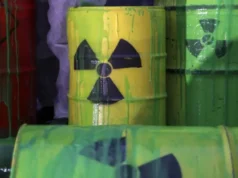Panama responds to Trump’s threat to retake vital waterway

By Jennifer Hicks
In a dramatic escalation of rhetoric, US President-elect Donald Trump has sparked international controversy by threatening to retake control of the Panama Canal, a vital waterway that has been under Panamanian control since 1999.
This move has prompted a swift and defiant response from Panama’s President Jose Raul Mulino, who reaffirmed his country’s sovereignty and rejected any insinuation that the canal might be at risk of foreign domination.
During a speech at the America Fest conference in Arizona on December 22, Trump criticized the “exorbitant” fees imposed on American vessels using the canal.
He accused Panama of exploiting the United States despite what he characterized as “extraordinary generosity” on the part of America in transferring control of the canal to Panama.
“We’re being ripped off at the Panama Canal, just like everywhere else,” Trump proclaimed, vowing to “demand that the Panama Canal be returned to the United States of America” if the situation is not rectified.
Trump’s remarks also included a warning to Panama about the canal’s potential vulnerability to Chinese influence, which he described as a threat to US commerce and national security.
Trump further fuelled tensions by sharing an image on Truth Social depicting an American flag over the canal, captioned, “Welcome to the United States Canal!” The post drew widespread attention and added to the controversy surrounding his statements.
In a nationally televised address, President Jose Raul Mulino responded with unwavering resolve, emphasizing that Panama’s sovereignty over the canal is “non-negotiable.” Mulino highlighted the historical significance of the canal’s transfer to Panama under the Torrijos-Carter Treaties, which were signed in 1977 and came into full effect on December 31, 1999.
“Every square meter of the Panama Canal and its adjacent area belongs to Panama, and it will continue to be so,” Mulino declared. He described the canal as a symbol of Panama’s “history of struggle and an irreversible conquest.”
Mulino also rejected Trump’s accusations regarding the canal’s fees, explaining that the rates are determined transparently, based on market conditions, international competition, and the operational needs of the canal.
He asserted that Panama’s management of the canal since its handover has been exemplary and has not drawn any objections from the international community.
The Panama Canal, completed in 1914 under US administration, has long been a linchpin of global trade, linking the Atlantic and Pacific Oceans.
For much of the 20th century, the canal was controlled by the United States, which retained sovereignty over the Canal Zone.
However, Panamanians’ dissatisfaction with US control culminated in the 1964 anti-American riots, during which Panamanian students clashed with US forces over the right to fly Panama’s flag in the Canal Zone.
These events ultimately paved the way for the Torrijos-Carter Treaties and the eventual transfer of the canal to Panama.
Since taking control, Panama has successfully managed the canal, ensuring its neutrality and open operation for vessels from all nations.
The canal generates billions of dollars annually for Panama’s economy and is a source of national pride.A key element of Trump’s argument is his claim that the canal could fall into “the wrong hands,” with specific reference to China.
He argued that a secure Panama Canal is crucial for US commerce and the rapid deployment of naval forces.
While Trump did not provide specific evidence of Chinese interference, his remarks tapped into broader concerns about China’s growing influence in Latin America.
President Mulino dismissed these claims, stating that Panama’s government maintains complete control over the canal and that no foreign power, including China, has direct or indirect control over its operations.
Mulino also underscored that the canal’s permanent neutrality is enshrined in the Torrijos-Carter Treaties, ensuring its availability for all nations.
The Panama Canal remains a vital artery for global trade, accommodating approximately 14,000 vessels annually and facilitating the movement of goods worth hundreds of billions of dollars.
For the United States, the canal is particularly important, as it significantly reduces shipping times between the East and West Coasts.
Trump’s remarks have raised questions about the future of US-Panama relations. While the United States remains a key trading partner for Panama, Mulino’s strong response indicates that Panama is unwilling to compromise on its sovereignty, even in the face of pressure from a major power.
Trump’s comments have drawn mixed reactions globally. Critics argue that his threats undermine international law and could destabilize US relations with Latin America.
Others view his rhetoric as a strategic move to rally domestic support by invoking nationalist themes.In Panama, Trump’s remarks have united political factions in defense of the canal.
Many Panamanians see the canal as a hard-won symbol of their independence and are unlikely to tolerate any suggestion of foreign interference.In his address, Mulino expressed hope for continued cooperation with the United States on issues such as drug trafficking, terrorism, organized crime, and illegal migration.
However, he made it clear that Panama’s sovereignty over the canal is non-negotiable. “Panama respects other nations and demands respect,” Mulino stated, signaling his government’s commitment to defending the country’s interests while maintaining constructive ties with the incoming US administration.
The controversy surrounding Trump’s remarks on the Panama Canal underscores the complexities of US-Panama relations and the enduring significance of the canal in global geopolitics.
While Trump’s rhetoric may appeal to his base, it has also highlighted Panama’s resolve to safeguard its sovereignty and independence.
As the world watches, the canal remains not just a critical economic asset but also a powerful symbol of national pride and autonomy for Panama.



